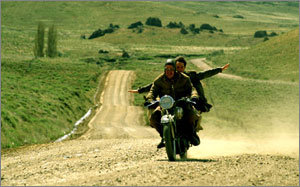Che Guevaras Beautiful Journey
Che Guevaras Beautiful Journey
Posted October. 27, 2004 23:19,

The Motorcycle Diaries is strong because it is honest. And it is dramatic because it doesnt try to be a movie. Che Guevara the revolutionary may have liberated the Cuban people, but this filmic retelling of his youth liberated a word whose meaning had long been fixed rigid. That word is road. The movie, shot in a hand-held method, depicts a road that is organica living, breathing entity capable of the entire range of human emotions. In the moment you realize this truth, youve already stolen a vital part of Guevaras own revelations.
The Motorcycle Diaries, which opens on November 12, recounts the eight-month trek of a green and fragile 23-year-old medical student named Ernesto Guevaraknown as Fuser to his friends, long before he went on to become El Cheacross Latin America. Fuser (played by Gael Garcia Bernal) travels with his friend and biochemistry student Alberto Granada (Rodrigo de la Serna) through the arid lands and historic sites of Argentina, Chile, and Peru. During the course of his journey, he gradually gains the insight that will transform him into a revolutionary.
Fusers journey toward this revelation coincides with the process through which he learns that the road, the people he meets upon it, and the land inhabited by them are one and the same. His remark, Something has changed while Ive been on the road, sums up this crucial idea. The reason why the film goes beyond mere beauty and achieves a radical romanticism is because its subject (the road), its theme (the people), and its sentiment (the land) form an exact union. If you feel that the rolling river, the wind that sweeps through the fields, the swirling blizzard, and the scorching sun are speaking to you in some way, then youve said all you need to say about this movie.
An old woman slowly dying in isolation, a worker risking his life for one days pay, a prostitute met on a boat The powerful realism of the film, which consists of a nuanced, documentary-esque repetition of brief meetings and partings with such various local inhabitants, stems (perhaps ironically) from the fact that it passes everything by instead of becoming fixated on any single place or person. The Motorcycle Diaries chooses to show rather than tell, and this initial strategy is highly addictive for the audience.
But the film changes attitudes toward the middle, when Fuser, ailing from asthma, pushes on ahead of Alberto and hastens his steps upon the road. At that point, the narrative penetrates straight into Fusers realizations. During the latter half, which shows Fuser and his companions arriving in San Pablo (the largest community of leprosy patients in Latin American) and living side by side with the patients they meet there, Fuser grows dramatically from a 23-year-old would-be-doctor to the healer of the age. This brings his trek of eight months to its conclusion. After narrating an extraordinarily significant tale with an almost feather-light touch, the film abandons the chief source of its appeal and starts to speak in direct terms.
The later parts of the movie are intense and powerful for those who long for Che Guevara. But for those who want a movie, its repetitive. Why does meaning always have to be spoken in strong accents, and revelations always hammered home?
Directed by Walter Salles of Central Station fame. Official entry at this years Cannes Film Festival. For viewers 15 or over.
Seung-Jae Lee sjda@donga.com







